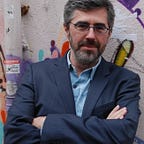Telling stories, with great care.
Since the beginning of humankind we have been telling stories. We can’t help it. We talk, we write, we draw, we act, we sing, we mime, we meme, whatever it takes.
Some of these stories are in and for the instant, a frame to hold a message you want to convey, some serve to entertain and amuse, or to share experiences and knowledge.
Some stories support broader narratives to carry on traditions and reinforce culture through the centuries, help people understand a vision and create strong brand equity, or build shared momentum for your cause.
I was reminded recently by this when reading about who has turned out to be quite a remarkable story teller, little wonder perhaps since in addition to being a politician he is also an actor; Volodomyr Zelensky.
Zelensky uses many of the levers of story telling in making his strong case as he virtually goes around the world, addressing parliaments and rallying politicians to influence them to give more support to his country.
A bit of impromptu alliteration (one among many story telling techniques) might suggest that he uses Context, Connections, Clarity and Care as mechanisms to make his case.
He is always clear on who his audience are, using relevant specific local iconic historical and cultural references that he knows will resonate, and actively ties them back to his own unfolding story of today.
When in the UK, he refers to the Battle of Britain, Shakespeare, and Churchill; in the US he speaks of Mount Rushmore, Pearl Harbour, 9/11, and Martin Luther King; in Germany he turns to the fall of the Berlin Wall; in France the revolutionary motto of 1789 that still rings true to many of the French today of ‘liberté, égalité, fraternité’ (freedom, equality, brotherhood); and so on.
When I wrote my Master thesis in international business at IBM Japan, I came across Takeo Doi, a Japanese psychoanalyst, when trying to better understand the Japanese psyche, and two brilliant books called ‘The Anatomy of Self’ and ‘The Anatomy of Dependence’.
One of Doi’s arguments was that contrary to Western popular beliefs, it is really an illusion that we exist as pure individuals. We are who we are in the context of relations to others, it is in that interplay and interconnections that we define ourselves and become who we think we are.
And that is one of Zelensky’s recurring themes within his narrative, to build a sense of a ‘joint us’, that what is happening isn’t just limited to Ukraine, it has global and historic implications as an attack on shared ideals. We’re all in it, all connected.
Sweden used a similar approach back in the day when the Soviet Union tried to invade Finland in the Winter War of 1939–1940, declaring that ‘Finlands sak är vår’ (The Finnish cause is ours), to support a campaign of recruiting volunteer soldiers and sending aid to our neighbour country.
Interestingly and unsurprisingly, that theme has now been picked up by local campaigners in Sweden, declaring that ‘Ukraine’s cause is ours’.
Zelensky’s narrative also (somewhat effortlessly) has clear heroes and villains, to fight the counter narrative and disinformation campaigns from Russia, and to make you pick a side, unambiguously.
He creates strong tension, another classic story telling technique, not only by the obvious fact that it is a horrible human situation that gets worse by the hour, but by challenging his VIP audiences like in Ireland that they ‘almost stand with Ukraine’. Ouch.
Ultimately, he wants to make sure we care, by understanding the broader context and the relevant connections with great clarity.
Another actor turned politician has weighed in (literally in his case) as story teller on the side of the Ukraine narrative to counter misinformation with great clarity and care, namely Arnold Schwarzenegger.
His story, which gives and gets respect by showing he cares about the real Russian people, is based on some strong personal connections with Russia and Russians from his childhood, in particular his inspirational child hood hero (that word again, every story needs one) Russian Olympic weight lifter Yuri Vlasov.
For our final actor on the world stage turned politician and indeed president, telling stories about the Soviet Union, I give you a few selected jokes from Ronald Reagan.
“I am collecting stories, that I can actually prove are told among the Russian people, they make them up themselves and tell them between themselves, revealing that they’ve got a great sense of humour, and they’ve also got a little cynical attitude about things in their country…” - Ronald Reagan
Jokes are short stories, and humour can be a powerful weapon in political discourse. It’s no accident Reagan is telling the jokes he is, while it helps personify and demystify a far away enemy during the Cold War, and make a connection to make both them and him seem more personable, it also plays a game of one-upmanship in pointing out the differences in success between the two rival political worldviews and systems.
“…which makes me think of a story, well everything makes me think of a story…” - Ronald Reagan
Along that line, let me leave you with a thought on connections, one of my favourite quotes from that great designer Charles Eames, and something to bear in mind whether you are telling stories, designing services, or maybe in whatever it is you do… do read it a few times and reflect.
